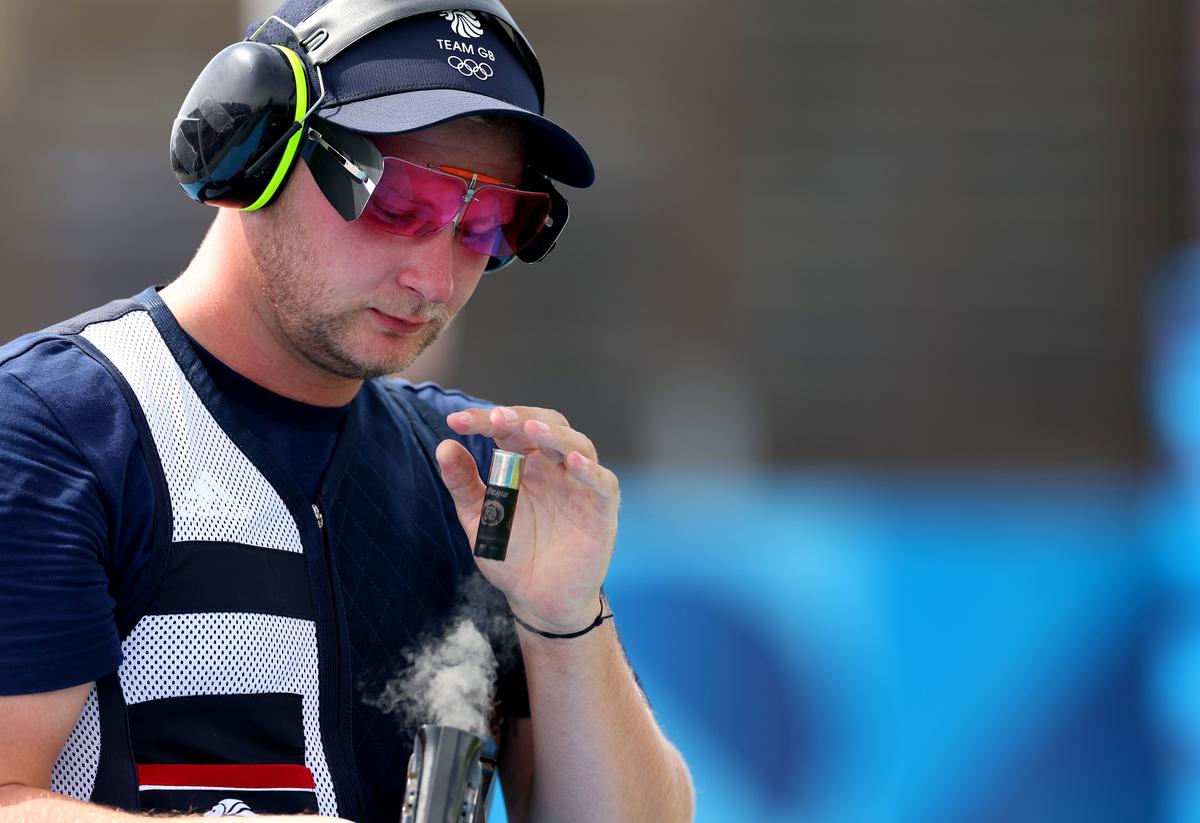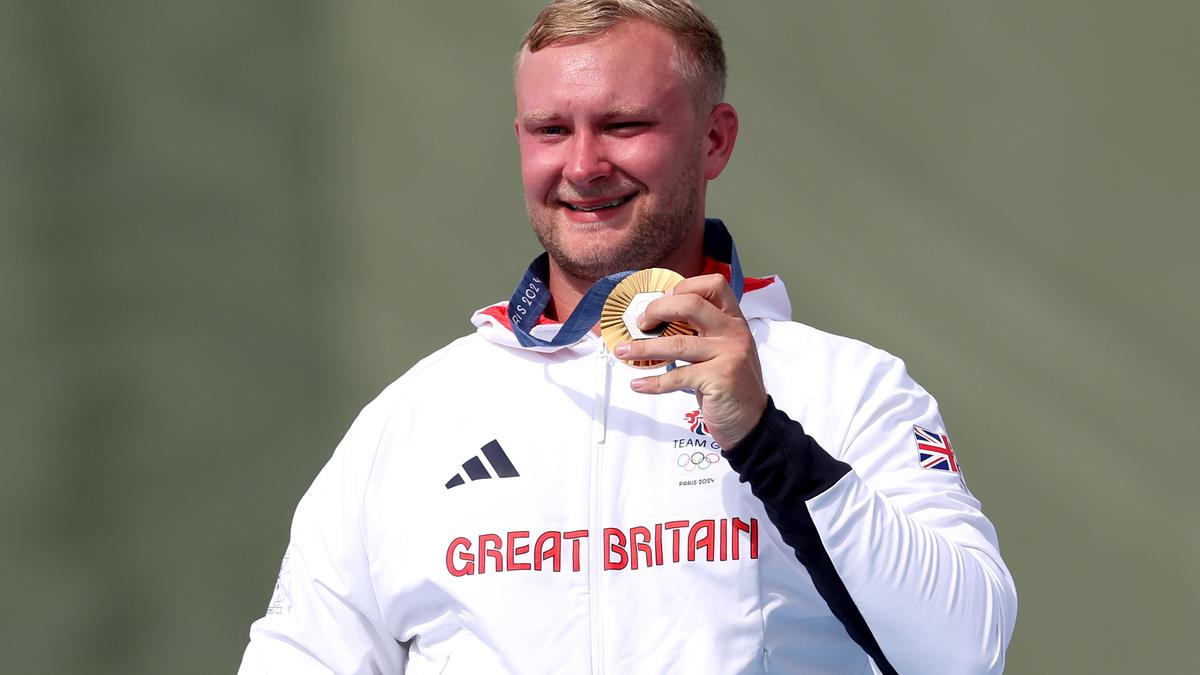ISSF World Cup final: Paris 2024 Olympic Champion Nathan Hales sets sight on LA 2028 cycle
When he arrives in New Delhi next week to compete at the ISSF World Cup finals, Nathan Hales will be doing so with the reputation that comes with being the Olympic men’s trap shooting champion. Not only did the 27-year-old win gold in Chateauroux just a couple of months ago he also smashed the Olympic record with a score of 48/50 in the final – erasing the old mark of 43/50.
Yet Hales is realistic about his chances at the Karni Singh Shooting Range. He’s barely had any practice since winning his Olympic title. “I’ve only just started training properly this week,” he tells Sportstar from England.
“I managed to shoot a couple of times throughout last month, but all-in-all I’ve only two days on range. We will be flying out to India on Sunday night so I might get a few more days at the range. Training hasn’t been as I would have liked to, but we’ve done a lot of training this year, so hopefully, I can rely on that to pull me through,” he says.
If Hales hasn’t been at the range as much as he would like, it’s because life’s very different for him now as an Olympic champion. “I’m not so worried because I’ve never been someone who did a lot of training rounds. So I’m not very nervous about shooting at the World Cup finals. It’s just that I haven’t been able to commit the time to training since the Games. Things have been very busy. There’s been a lot of media attention. I’ve been trying to sign contracts and get sponsorships sorted out. I’ve been trying to see the people who supported me through the years and thank them. You can’t forget who’s helped you on the way up because, at some point, you’re going to run out of form and need the help of the same people when you are on the way down,” he says.
READ | ISSF World Cup Final 2024: India to field largest contingent with 23 shooters
Hales admits he’s still getting used to the entire media cycle. “There’s a quote I saw on social media that applies to me. It says — everyone prepares you to win, but nobody prepares you for what happens when you win. Things went far crazier than I would have thought. The media and everything straight after the Games was crazy for probably four or five weeks after. Social media – my phone and email were going crazy. It caught me off guard. I wasn’t expecting it at all,” he says.
New experience
While shooting isn’t the most popular sport in England, the fact that his medal came on a relatively dry day medal-wise helped. “On the day that I won the trap gold, I think from the time I won until about 9 pm, I think, I was possibly the only medallist for Great Britain. Because of that, I got a lot of media attention and TV time because there was nothing else going on. I mean that was pretty good for the sport and me personally. I’m meeting people I wouldn’t have met before. I’ll be going to Buckingham Palace to meet the King and Queen next month, and I’ve got a chance to meet (Formula One great) Jackie Stewart,” he says.
That attention has come with its challenges. His Olympic gold medal, for instance, isn’t mounted on a wall at his home but packed away in a safe. “Everyone wants to see my medal, so I have to be a little careful with it. Eventually, I’ll get some of my kit and bits and pieces like that from the Games framed and mounted on the wall. But for now, the medal gets to stay in a safe at home because I’m not so sure it would be easy to replace it if it got stolen. These are the sort of things you think about after you win a medal,” he says.
If there’s someone for whom the medal still doesn’t mean nearly as much as it does for Hales, it’s likely his two kids. “It doesn’t make that much of a difference to my kids. My little boy is nearly seven. So he sort of understands things a bit more. My little girl is only 19 months old. So yeah, she doesn’t have a clue, which is nice. Now that the Olympics are over, I still have my typical father duties to do. My wife is working at the same time, so I do my fair share of childcare,” he says.
New Challenges
Childcare may need to be put on hold as he prepares to compete in India in a week’s time. The World Cup finals might be the year-ending competition of the international shooting calendar for 2024 but they are also the first competition of the Olympic cycle for the 2028 Los Angeles Olympics. As he prepares for the start of a new Olympic cycle, Hales knows there will be obstacles to overcome off the range as well.

If Hales can find a balance, he knows that it will not be easy to recreate the magic of an Olympic cycle that saw him not only win the Olympic gold on debut but also set the world record prior.
| Photo Credit:
Getty Images
If Hales can find a balance, he knows that it will not be easy to recreate the magic of an Olympic cycle that saw him not only win the Olympic gold on debut but also set the world record prior.
| Photo Credit:
Getty Images
The fact that he has two growing children will likely be one of them. “I guess things will become a little more challenging in the next Olympic cycle because my kids will get older. I’ll have to balance my family life a lot more. I think as the children grow, it becomes harder to leave. At the moment, my daughter Hattie can’t tell me that she’s going to miss me or doesn’t want me to go. As she gets a bit older, she’ll be able to tell me that. I think that’ll make going away harder. But, you know, the long and short of it is, it’s me travelling and competing, which, you know, enables us to have the lifestyle we have,” he says.
Even if Hales can find a balance, he knows that it will not be easy to recreate the magic of an Olympic cycle that saw him not only win the Olympic gold with an Olympic record on debut but also set the world record prior. “I’ve spoken to some people, and they’ve said the next Olympics will be easier for me. I’m unsure about that. I guess we will find out in four years if we get there. I suppose the only thing is that I can’t chase records. I have to sort and let the performances happen. I think if you try and chase records, it makes them that much harder to get,” he says.
Hales says the key to a strong performance in 2028 will be simply to enjoy the process of shooting and preparing for the Olympics. “I think what I enjoyed the most about the previous Olympic cycle was the whole training process. I was able to learn about myself and my shooting. I worked in the gym, which was different because I hadn’t worked in the gym in previous years. But I think the highlight of the four years has to be the Olympic games. I think it’s the highlight of any sportsperson’s career. I enjoyed the whole experience from getting kitted out, to getting out to the event, travelling, the whole thing I tried to embrace and enjoy the whole experience,” he says.
“I sort of know what works and what doesn’t. So we’ll look back through the plans from the last three or four years, get everything planned, and then we will start getting ready for the next cycle, look and see if there’s anything that needs changing within training plans. Then give the next cycle my best shot, the same as we did this time.”
Bigger aims
But while things might have gone nearly perfectly for him, he admits there are things he would like to improve on. “My coach and I are always checking body position, foot position, that kind of thing to make sure that’s all correct all the time. And I think it’s just generally keeping an eye on all those little things. But I’ll be making a big change. I will be switching to using the Beretta SL 2 trap gun. The gun I’m currently using is one I’ve shot since 2018 but I think now is a good time to make a change. It’s got some new barrel technology, which I believe nobody else has got, which could be, it could be very big in terms of trap shooting. I think I’d be silly not to give it a try. I can always go back to my current gun. It’s not written that I have to use the new SL2, but I think it’s worth giving it a shot and seeing how I get on with that. I think it could be a bit of a game changer, to be honest,” he says.
The change of the gun will have to wait until after the World Cup finals. That’s when the 2024 calendar ends and Hales can seriously start preparing for the Los Angeles Olympics. “I think, post the World Cup is when we get into the next Olympic cycle. That’s when things will calm down a little bit. I’ll be able to get my training back on track through winter,” he says.
If Hales is looking forward to getting his training underway and trying out something new, it’s because even with Olympic gold in hand, he isn’t willing to be satisfied. “I might have accomplished the biggest thing there is in sport shooting, but I do have more goals. I want to compete in as many Olympics as I can. I plan on going for at least another two, but another four would be good. In Great Britain, we’ve never had a double Olympic medallist in shooting. I would love to be able to be the first British double Olympic medallist in shooting. That’s a goal now for sure. Yeah, and then see where we go from there really,” he says.



